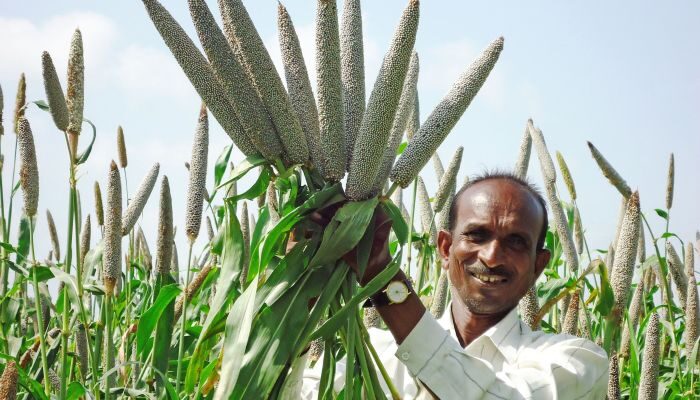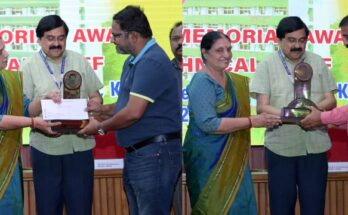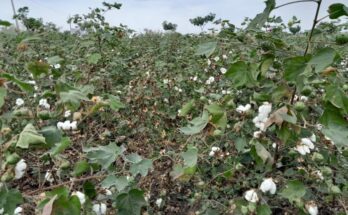The much-debated issues of low productivity levels in India and the resultant perennial struggle of Indian farmers of low income are the two major ones being looked at seriously by the two organisations; International Crops Research Institute for the Semi-Arid Tropics (ICRISAT) based at Hyderabad & the US water tech company, Plasma Water Solutions India based at Mumbai. This mission will be enabled by germplasm and genetic studies with ICRISAT gene bank accessions, and technology trials with different applications of plasma technology at different stages of crop life cycles using the testing capabilities of ICRISAT and real-world field POCs in partnership with farmers and growers. This understanding was formalised through a memorandum of understanding (MoU) signed by the two organisations at Hyderabad, Telangana, India. Robert Hardt, President & CEO, Plasma Waters along with its global management team; Jerry Zuchowicki, CRO; Dr Roger Pennell, CDO and the India MD, Pragya Kalia visited facilities at ICRISAT to discuss various study areas relevant to the region.
“Plasma Waters technology uses simply air, water and electricity to convert water into Plasma-ized Water ‘in-situ’, in a continuous flow from any source by passing the water into the patented Plasma Chamber. Plasma-ized Water is pathogen free and consists of certain reactive oxygen and nitrogen species which boosts the immunity system in seeds and plants. Through extensive field tests at large scale in the USA, it has been validated that Plasma-ized Water enables better and faster growth, deeper root mass, disease resistance and stress tolerance levels in plants. This results into higher quantity and better quality of yields for farmers with a reduction in chemicals usage during the farming process which makes it a very healthy proposition for consumers and much needed sustainable practice for our environment. Results have shown up to 20 per cent increase in agricultural output promising hope for millions of farmers suffering from declining yields across India and sub-Saharan Africa,” Plasma Waters claims.
You may also like to read: How are technological disruptions revolutionising agricultural practices in India?
Plasma-ized waters application ranges from seed treatment, crop protection and irrigation. Results have been transformative in sorghum, millets, high-value crops, cotton, melons and horticulture crops.
“I’m extremely delighted today as we embark on a remarkable journey with ICRISAT to realise our vision of bringing the second sustainable green revolution in the world and contribute meaningfully to the food security for our future generations. What our founder Alfredo Zolezzi of Chile started years ago with this vision is taking a meaningful shape and is being well received and supported by like-minded organisations like ICRISAT. Our plan is to jointly explore the areas of opportunities in various dryland crops of different regions in India first and then the rest of the world. We will study different ways of interventions using our technology to support ICRISAT in their programmes in India, Asia & Africa and transfer this knowledge in building beneficial value propositions for farming communities in this region,” said Robert Hardt, President & CEO of Plasma Water Solutions Inc, USA.
Speaking at the MOU signing, Director General of ICRISAT, Dr Jacqueline Hughes said the collaboration with Plasma Waters and their technology exemplified the new innovations being tested by ICRISAT and its partners to transform the drylands.
You may also like to read: Technical support from ICAR-IIVR led to success in protected cultivation of vegetables
“Once proven through rigorous testing, this new technology has the potential to vastly improve millet and other dryland crop cultivation, especially in areas of India and Sub-Saharan Africa where we are seeing declining yields in some regions. While it is early days and more trials need to be conducted in the dryland context, the technology is attractive due to its relative simplicity, practicality and low power usage, which may suit various dryland environments. I appreciate the commitment of Plasma Waters to improving food security and look forward to our collaboration to boost agricultural output and with it the quality of life and livelihoods of dryland farmers,” said Dr Hughes.
“With over 60 per cent of the farmers dependent on monsoon, over 90 per cent being small and marginal farmers and with the average 1-2 acre of landholding, most of them are left out untouched by the latest technology purely due to affordability and viability. We intend to design the business models keeping this at the fulcrum of our strategy. ICRISAT alliance will help us develop solutions backed by strong scientific data yet applicable in a practical manner”, said Pragya Kalia, Managing Director-India, Plasma Waters.






To the agriculturepost.com, You always provide clear explanations and definitions.